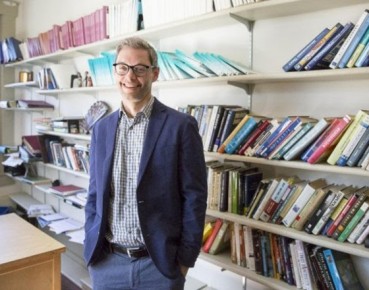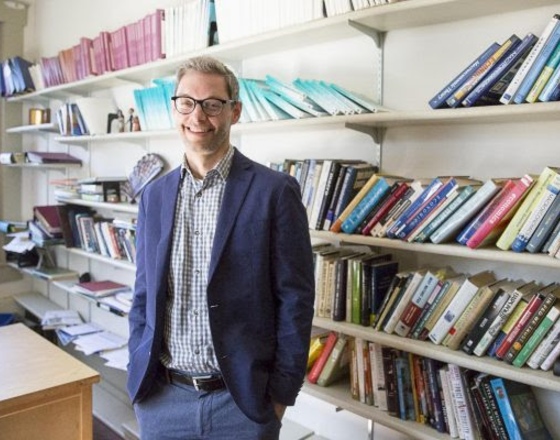
(©Todd Knopp)
Obserwator Finansowy: Will there be a global recession?
Professor Todd Knoop: Most likely.
You deal with recessions professionally.
Yes. You could say so.
So, what exactly are we facing today? What could we compare it to?
I’m going to disappoint you, but in this case the past does not provide us with many clues.
What do you mean?
Economic historians are trying to examine the course of the past crises and identify some common elements, similarities. The current crisis is unique, however. This is one of those unknowns.
So, can you say anything about it?
I can tell you how it’s been up to now.
How?
We have to distinguished transitory and permanent recessions. Transitory recessions are those that arise as a result of a shock that disturbs the functioning of the economy and disrupts the growth trend. The level of confidence among consumers drops, and they start saving excessively. This is partly a self-perpetuating mechanism, a psychological impulse. But once the initial shock subsides, the economy recovers quickly.
Is this not the type of crisis that we are going through now?
You would think so, but then there are also permanent recessions. They occur when not only demand but also production capacity declines in the economy. The levels of savings decrease, followed by a drop in investments. As a result, the economy falls into stagnation for a long time. The problem is that short-lived recessions can evolve into permanent recession, although they don’t have to. Let’s take the example of the Great Depression of 1929. It was sparked off by a panic on the stock market. In theory, everything could get back to normal once things calmed down. But in that case the situation did not get back to normal and the crisis lasted for many years. This happened, because people lost jobs for so long, that they also started losing competencies required to find a new employment. This led to huge unemployment and a decline in investment. As a result, production capacity in the economy decreased. One more recent example is the tsunami in Japan in 2011. The economic disruption was caused by a natural disaster which reduced production capacity for a very long time. A temporary recession evolved into a long-term recession.
Is this the threat that we are facing today?
Yes. On the one hand the pandemic is a classic example of a shock that could cause a short-term disruption. On the other hand, however, it could turn into something more permanent, especially if economic lockdowns are kept in place for longer. If that happens, then it may turn out that it will not be so easy to rebuild the disrupted supply chains and value chains, and that a deeper restructuring of the economy will be necessary. The likelihood of such a scenario will increase if it also turns out impossible to return to the previous lifestyle, travel, and unfettered interpersonal contacts.
Is this crash simply an act of God? Was this inevitable?
Not really. Today’s economic problems are the result of the prevailing attitude of the market participants, who are doing everything at the last minute and optimizing everything. American hospitals hold supplies sufficient only for a month because they are convinced that they can always purchase these products if necessary. Well, the pandemic shows that sometimes it is not possible to replenish your supplies just like that. The same holds true for the corporate sector — if someone is able to reduce the stock storage time from 4 to 2 weeks they are applauded, because they increased business efficiency. But the truth is that they also increased their risk exposure. Low reserves and low savings were the pre-crisis reality of the global economy. And this trend has been intensifying. The most profitable companies were most vulnerable to shocks. The status of their shareholders is now changing from millionaire to zero.
Has there ever been a time in history when people didn’t seek to optimize production?
There were such periods and they occurred regularly. After a crisis people always take a more conservative approach. For example, after the financial crisis of 2008, for few years we had less leverage on the market, fewer loans, more reserves. However, over time we were becoming more optimistic and the attitude started to change. The risk appetite grew, and shareholders demanded higher returns on capital.
So maybe a crisis would have erupted anyway, with or without the coronavirus?
Yes, but I don’t think it would have started as quickly as it did. The situation was not as unstable as before the previous global crash. Nevertheless, a crisis would have taken place sooner or later. That’s certain.
Certain?
Yes. There is a saying in finance that the costliest words uttered in history are “this time will be different”. No, it won’t. The same behaviors bring the same results. This has been true for the past 200 years.
The unique nature of the current crisis also lies in the fact, that it was directly triggered by humans. We decided that we want to protect people’s life in exchange for decline in the GDP.
I see this differently. As an investment. We’re investing a little bit of our GDP now, so that it can grow in the future. It would be good if the politicians talked about the lockdowns in that way.
At the beginning of our conversation you said that the current crisis is unique.
When it comes to what exactly caused it, how it is being managed, and the fact that it has no precedents in history, then yes, it is indeed unique.
And what about the Spanish flu? Didn’t it cause disruptions in the economy?
It did, but the problem with assessing its economic effect is that it is difficult to look at them without ignoring the broader effects of the World War I, during which that epidemic broke out.
In the theory of economics there are several opposing explanations concerning the causes of recessions. Do you support any particular point of view?
I’m a pragmatist. I treat economic theories like golf clubs. I choose the one that best explains a particular problem. There is no single theory that describes everything perfectly. The economy evolves, so some theories become obsolete. I’m not dogmatic.
Let’s check. Crises are caused by government intervention, excessive credit, and over-investment.
The Austrian school. I value it for a number of insightful observations, but it tries to explain everything using the same arguments. We cannot explain the current crisis with over-investment alone. It wasn’t caused solely by erroneous decisions of overly optimistic entrepreneurs. The main cause of this crisis is that for safety reasons entrepreneurs were prohibited from pursuing business, and that for the same reason they momentarily lost their customers. In this case the theories of the Austrian school aren’t particularly useful.
Crises are caused by “animal spirits”. The role of the state is to tame them.
Keynes. The answer is both yes and no. Again — the pandemic, and, consequently, the economic crisis, was not caused by animal spirits. But these animal spirits can certainly drive the subsequent panic. And the state can indeed help in this regard.
A genuine supporter of the Austrian school would be outraged by such suggestions. The state will “help”, which means it will only generate more corruption and inefficiency.
Yes, but these are costs that are, in a sense, necessary. I think that even a supporter of the Austrian school could agree with this, since we’ve already established, that the crisis was provoked by administrative decisions.
Does history show that government interventions in times of crisis are a good idea? The economist John B. Taylor of Stanford University demonstrated that, for example, the impact of the 2008 fiscal stimulus package on the US economy was negligible.
Economists vary in their assessments. I believe that the fiscal stimulus package was important, and that without it the situation would have been worse, not better. Many researchers even claim that the stimulus could have been more effective if it had been launched faster and on a bigger scale. Unfortunately, it was introduced in a conservative manner as the authorities feared that the money could go into the wrong hands, to those who did not deserve it. And yet, from the point of view of preventing the collapse of the economy, this was an issue of secondary importance, a necessary cost to bear. Today we also need decisive, concentrated actions.
And it seems that all the governments are implementing such measures.
But they are still not acting as decisively as they should. For example, in the US everyone can theoretically receive a stimulus check in the amount of USD1,200, but in practice they have to go through a lot of bureaucratic procedures, such as presenting their tax returns. As a result, the money does not come in fast enough and does not have the desired effect.
But sooner or later, trillions of dollars will be pumped into the global economic system. Aren’t you afraid that once it’s over, it will turn out that the public debt — which will increase in the process — will be impossible to repay? After all, tax revenues can be expected to fall significantly in all countries.
This is a fact, today all countries are taking on new debt, but we should keep in mind, that it’s cheap because of the low interest rates. Additionally — and perhaps most importantly — investors now see government bonds as even safer than gold, and certainly safer than corporate securities. They simply believe that the states will pay its debt, because they have been doing so thus far. I don’t think investors are analyzing the finances of the countries whose bonds they are purchasing. This is done by economists, not investors. Especially countries with high credit ratings, including Poland, can feel relatively safe.
In the 19th century we also had crises, but governments did not introduce anti-crisis packages. It was a different world back then. Active anti-crisis policies only emerged in the 20th century. How effective are they?
Since the end of World War II crises have been more or less 20 per cent shorter, 20 per cent less severe and 20 per cent less frequent than before. I think that this could be seen as a success. This is in part thanks to the monetary system based on central banks. It is precisely the monetary component of the government’s actions, and not the fiscal one, that is responsible for stabilizing the business cycle. In the days of the gold standard, before World War I, that would have been impossible. Of course, I’m talking about statistical averages. If the current crisis reduces GDP by 20 per cent, and there is a good chance of that, then the observations I have made will be much weaker. We should remember that central banks also make mistakes and we’ve already had several crises triggered by them.
Do you agree that crises cannot be completely eliminated?
It’s not possible. However, we can manage them. The economy is a reflection of the people. People are unstable so the economy is also unstable. People can mitigate their instability, and therefore we can also mitigate the instability of the economy. My vision of an economist is close to what Keynes once said: if economists managed to improve their professional performance, they would be treated like dentists. While teeth will always decay, a dentist can at least relieve the pain.
How, then, could we relieve the pain of crises in the long term?
We could use a global currency, not necessarily for domestic settlements, but for interbank and international transactions. With a global currency and a global central bank, it would certainly be easier to manage the monetary system and improve its stability.
This is politically impossible.
But I’m speaking as an economist, not a politician.
Professor Todd Knoop is a macroeconomist and a lecturer at the Cornell College in the United States.

